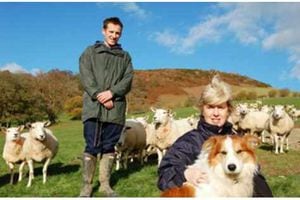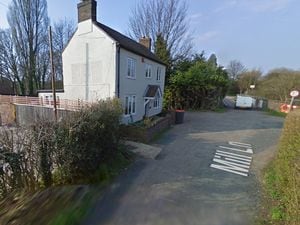Where have Shropshire's young farmers gone?

At the age of 26, Ben Dixon is becoming one of an increasingly rare breed - otherwise known as a young farmer.
Ben is a third-generation dairy farmer whose family has worked the land at Home Farm, Attingham, near Shrewsbury, since the 1960s.
But with younger people seemingly deterred from entering the industry, the average age of a UK farmer is now 57.
Which is worrying news if you are an enthusiast of Shropshire food, because the trend raises a serious question: what will happen to the region's wealth of agricultural expertise if the younger generation can't - or won't - take over when today's ageing farmers retire?
"The majority of farmers are of the older generation because it's not such an attractive industry for younger people to come into - lots of hours and not a lot of money," says Ben, who farms 85 Jersey cows for organically produced milk.
"There are easier jobs that people can do. It needs to be in the blood if you want to farm."
Luckily, Ben was determined to follow in the family tradition and studied agriculture at Harper Adams University College, near Newport. He farmed in America and New Zealand before coming back to Home Farm three years ago.
But not attracting young blood to farming could have serious consequences, says Ben.
"Only 50 per cent of food in the UK is produced here, and it's a crying shame when we have the land to do it.
"But one thing that pushes young blood out of farming is the price of land and the capital needed to run the business. I am lucky to come back to the family farm but somebody coming straight from the city, for example, would not stand a chance."
Ben's father Lawrence is in his late 50s - interestingly around the same age as the average farmer in the UK today.
For many other farmers at this juncture, facing looming retirement and unable to interest their offspring in taking over their land, they become the last in the family to till the land.
"It could be that their children have grown up on a farm, maybe, and have seen their father not having a social life and it's not the most appealing of jobs, so many decide against it," says Ben.
Iestyn Russell, 21, who two years ago won a Farmers' Union of Wales student bursary to study rural enterprise and land management at Harper Adams, chose to write a 1,000-word essay on the topic under the title: "What should the Welsh farming industry and government do to attract more young people into agriculture?"
Debate
"This question has been the subject of debate for several years. We need to deal with the problem now or our industry will face major problems in the future," he says.
"Rural Wales' young people are quite prepared to bridge the gap and take responsibility, but we must ask why they are not offered a chance to move forward within agriculture in Wales.
"Older farmers must take a step back and give young people a chance to experiment with their own ideas. But what encourages this to happen? Not a lot at the moment, but there are plenty of possibilities."
One neat solution to the age problem is illustrated by 22-year-old Dave Ward, from Whittington. From an early age it was always assumed that he would follow tradition and go into the family farming business. He even studied for a national diploma in agriculture.
"When I left school it was always intended that I was going to go into farming, but the situation changed and we diversified," says Dave.
"I never used the diploma because I came back and diversified into butchery and now we employ a number of staff."
The role augments his father's profession, bringing a fresh and sustainable dimension to a trade that has been in the family for 400 years.
He adds: "People are either sticking to having the family farm and not having to spend that much establishing it, or there are massive farms with 1,000 cows - it's either small or very large scale, and the ones in the middle are getting out of it."
John Phillips, 27, who runs Lower Treverward Farm at Clun, believes there is no shortage of young farmers out there, but they find it hard to establish themselves because land from estates is often broken up and offered to those who can pay more for it.
"I am the most optimistic person you will meet, but I am quite pessimistic about the future of this," he says.
John Sockett, 24, a third-generation beef-and-sheep farmer from Llansilin near Oswestry, was brought up on his father's and grandfather's farm but probably wouldn't have gone into the industry were his they not already involved.
"A lot of the reason younger people are not going into the industry is financial - and there are easier options," says John.
"Ninety per cent of farming is lifestyle and the love of the job, not the money.
"I know a lot of lads born and bred on farms who have taken against it because they have seen their parents struggling for money."
And although John sees himself farming for the rest of his life he believes that a lack of incentive to attract young people into farming could spell problems in the long-term.
"There isn't enough incentive for young people to come into farming and it is no use pushing your children into it because they are likely to push against you. But if nothing is done then the agricultural industry is in trouble.
"My father said that farming is here for you if you want it, it's your choice, but some fathers push their sons and at the age of 18 or 19 they don't want it."
John hopes one day to start a family himself and would be delighted if his kids took over the family business.
He says: "I would love them to, but I would not force them into it."





